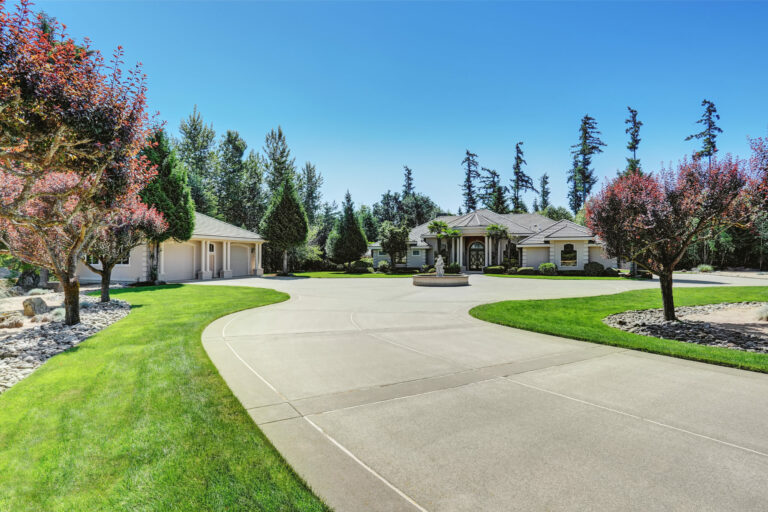Concrete vs Asphalt Driveway
Which material is better?
A driveway is an important part of a home. It offers a safe space to park and is often the first thing people see when they arrive on a property. Take into consideration how much a driveway installation will cost and the upkeep it requires when deciding which material to use. When you’re debating concrete vs. asphalt driveways, knowing the pros and cons can be very helpful. We have gathered some information so you can compare and contrast the two options and see why one may be better than the other.
Pros and cons of concrete driveways
Concrete driveways are durable and come in a variety of colors and designs. Concrete is one of the most versatile building materials allowing for total customization and maximum beauty. Not to mention, maintaining a concrete driveway is easier than stone, brick, or your other common driveway materials. However, concrete driveways do have some downsides. They can have a high upfront cost that some homeowners do not want to pay. But understand that in the long run, once you make this investment your concrete driveway can last an upwards of 30 years with the proper care! Lastly, using a sealer on your concrete will help protect it from damage but it can be slippery when wet, especially on stained concrete. You need to have a more cautious attitude when caring for concrete, but due to its durability it truly pays off in the end.

Pros and cons of asphalt driveways
The benefits of an asphalt driveway include its relatively inexpensive cost, they’re easy to install, and can be repaired in the event of an accident. The main downside to an asphalt driveway is that it will inevitably crack and deteriorate with age. Not to mention, it’s not environmentally friendly like concrete. Although there are a lot of good qualities to asphalt driveways, they are not the best option for everyone. If you’re hoping to add some personality or curb appeal to your home, you may want to consider an alternative type of driveway.

So what happens if we compare the two?
When looking at concrete vs asphalt driveways, it’s important to note that both have similar downfalls. Eventually, with any surface, you’ll be looking at aging issues such as cracking or crumbling but with proper upkeep on a concrete driveway, it will outlast asphalt by 20 years or more. Both types of driveways are prone to damage from temperature fluctuations and seasonal changes; however, concrete can be sealed to help with protection. When it comes to design, concrete is far superior. Between colors, patterns, shapes, and stamps, concrete is completely customizable. Because of this, concrete is usually the more expensive option but it will pay for itself when it comes to durability and strength.
Asphalt is a cheaper option for driveways and it is easier to maintain. However, concrete looks better and will increase your home value, and it is more environmentally friendly. If you are looking for a simple solution for your driveway that you plan to eventually replace, asphalt might be for you. For anyone looking for customization, unique design, and a more natural element, concrete wins every time. We hope our comparison on concrete vs asphalt driveways has given you the information you need to decide what will work best and suit your needs.
Home | Locations | Gallery | Commercial | Residential | Privacy Policy | Blog
© Copyright 2022 Sam The Concrete Man. All Rights Reserved.
Powered by Epoch

